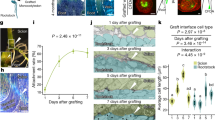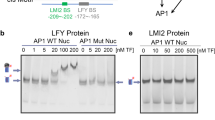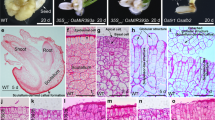Abstract
AMONG the plant species capable of neoformation, a much larger number are capable of root and vegetative bud formation than of direct flower neoformation. For most materials, the formation of buds or roots or flowers concerns different tissues, such as epidermis, perivascular or callus tissue of cambial origin, and each tissue maintains complex correlation with the surrounding tissues.
This is a preview of subscription content, access via your institution
Access options
Similar content being viewed by others
References
Tran Thanh Van, M., and Drira, A., Colloques int. Cent. natn. Rech. scient., 193, 169 (1970).
Author information
Authors and Affiliations
Rights and permissions
About this article
Cite this article
TRAN THANH VAN, M. In vitro Control of de novo Flower, Bud, Root, and Callus Differentiation from Excised Epidermal Tissues. Nature 246, 44–45 (1973). https://doi.org/10.1038/246044a0
Received:
Issue Date:
DOI: https://doi.org/10.1038/246044a0
This article is cited by
-
Effect of explant age on phytochemicals and morphogenesis in begonia
Plant Cell, Tissue and Organ Culture (PCTOC) (2023)
-
Transverse thin cell layer (tTCL) technology: a promising tool for micropropagation of Centratherum punctatum Cass.
In Vitro Cellular & Developmental Biology - Plant (2023)
-
Silver nanoparticles enhance the in vitro plant regeneration via thin cell layer culture system in purple passion fruit
Plant Cell, Tissue and Organ Culture (PCTOC) (2023)
-
Creating a novel petal regeneration system for function identification of colour gene of grape hyacinth
Plant Methods (2021)
-
Agrobacterium-mediated transformation of thin cell layer explants of Scutellaria ocmulgee small: a rare plant with anti-tumor properties
Plant Cell, Tissue and Organ Culture (PCTOC) (2016)
Comments
By submitting a comment you agree to abide by our Terms and Community Guidelines. If you find something abusive or that does not comply with our terms or guidelines please flag it as inappropriate.



